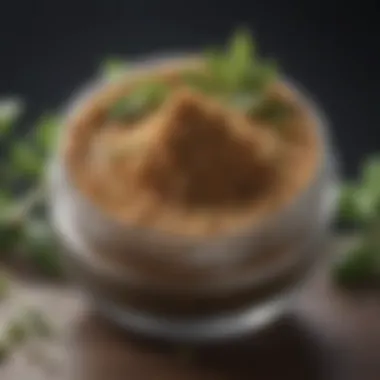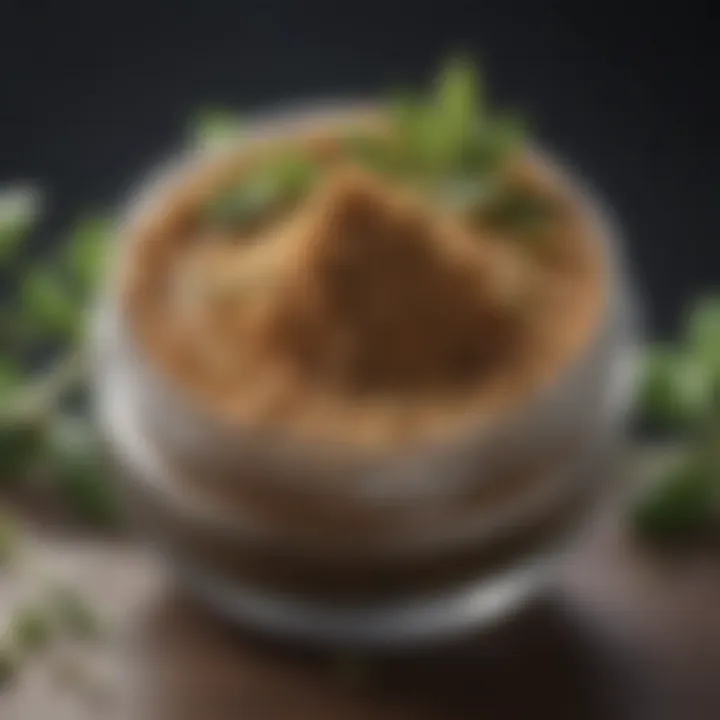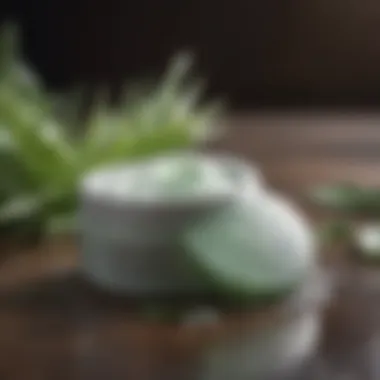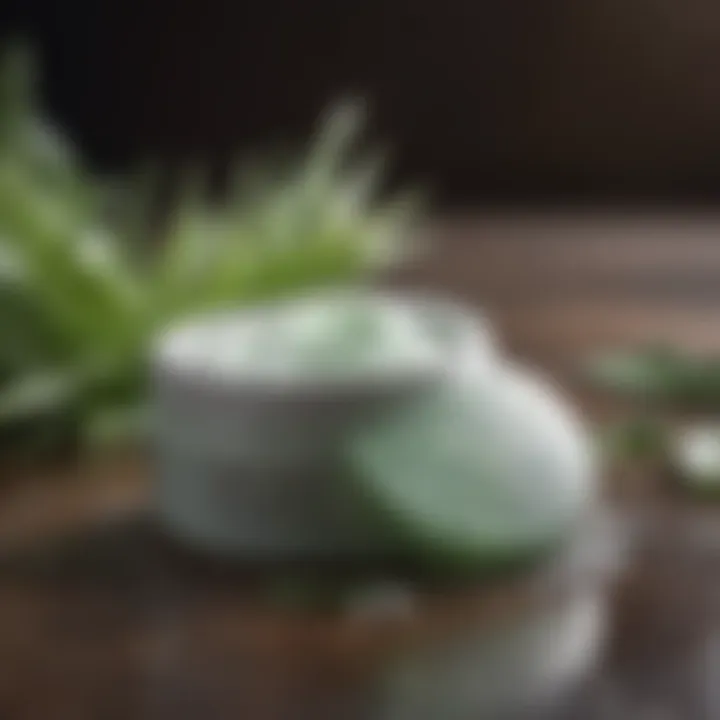The Ultimate Guide to Selecting the Best Exfoliator for Folliculitis Management


Beauty Tips and Tricks
Navigating the world of exfoliation can be daunting, especially when combating the stubborn condition of folliculitis. As you delve into the realm of skincare tailored to address this concern, it is crucial to equip yourself with the knowledge and tools necessary for effective management. Understanding the root causes of folliculitis and selecting the right exfoliator are key steps towards achieving a smooth and clear complexion. To ensure optimal results, incorporating exfoliation into your skincare routine is essential.
Product Reviews
When seeking the best exfoliator for folliculitis, thorough research and product reviews can be immensely beneficial. Exploring the efficacy of different exfoliators in managing and preventing folliculitis enables you to make informed decisions about your skincare regime. By delving into skincare product reviews specifically tailored to address folliculitis, you can discover top-rated exfoliators favored by individuals who have successfully tackled this skin condition. Evaluating the ingredients, formulation, and results of various exfoliators can guide you towards selecting the most suitable product for your skin type.
Expert Beauty Advice
Amidst the multitude of skincare options available, seeking expert beauty advice can provide invaluable insights into effectively combating folliculitis. Professional makeup artists, skincare specialists, and hair stylists offer tailored recommendations that consider your unique skin concerns and goals. Their expertise can shed light on the best exfoliation techniques and products to incorporate into your routine for managing folliculitis. By tapping into the knowledge of beauty professionals, you can optimize your skincare regimen and achieve skin health and clarity.
Beauty Industry News
Staying abreast of the latest developments in the beauty industry is essential for discovering new skincare innovations designed to address folliculitis. From product launch updates to beauty event coverage, staying informed about advancements in skincare technology and formulations can enhance your skincare routine. Additionally, learning about celebrity beauty collaborations and influencer recommendations can offer fresh perspectives on exfoliators tailored to tackle folliculitis. By keeping up-to-date with beauty industry news, you can access cutting-edge skincare solutions and stay ahead of emerging trends in skincare tailored to combat folliculitis.
Introduction
In this extensive guide focusing on finding the best exfoliator for folliculitis, we delve into the intricate world of skincare tailored to address this specific concern. Understanding the nuances of exfoliation in managing folliculitis is crucial for maintaining skin health. By selecting the right exfoliator, one can effectively manage and prevent folliculitis, ultimately achieving a smooth and clear complexion. The guide aims to equip individuals with the knowledge necessary to take charge of their skin health and make informed choices regarding exfoliation.
Understanding Folliculitis
Folliculitis is a common skin condition characterized by the inflammation of hair follicles. This condition often presents as small red bumps or white-headed pimples around the hair follicles. Understanding the underlying causes of folliculitis, which can range from bacterial or fungal infections to irritation from ingrown hairs, is essential in effectively managing this condition. Individuals with folliculitis may experience discomfort, itchiness, and in some cases, pain due to inflamed follicles.
Importance of Exfoliation in Managing Folliculitis


Exfoliation plays a pivotal role in managing folliculitis by promoting cell turnover and helping to prevent clogged pores. By removing dead skin cells from the surface of the skin, exfoliation reduces the likelihood of pore blockages that can exacerbate folliculitis. Moreover, exfoliation can help to improve the texture and appearance of the skin, leading to a clearer complexion. Incorporating exfoliation into a skincare routine can enhance the effectiveness of other topical treatments for folliculitis by allowing them to penetrate the skin more efficiently.
Purpose of the Guide
The primary purpose of this guide is to provide individuals dealing with folliculitis a comprehensive resource for selecting the most suitable exfoliator for their skin condition. By outlining key considerations, such as the gentleness of the exfoliator on the skin, its anti-inflammatory properties, and formulation to avoid pore-clogging, this guide aims to empower readers with the knowledge to make informed choices. Additionally, the guide seeks to educate individuals on the different types of exfoliators available and how to incorporate exfoliation effectively into their skincare routine for managing folliculitis.
Types of Exfoliators
In the realm of skincare, understanding the different types of exfoliators plays a pivotal role in crafting an effective skincare regimen, especially when combatting folliculitis. Each type - chemical, physical, and enzyme exfoliators - brings distinct benefits and considerations to the table. Chemical exfoliators, such as salicylic acid, work by loosening dead skin cells and unclogging pores. On the other hand, physical exfoliators utilize abrasive particles to manually exfoliate the skin's surface. Enzyme exfoliators, containing natural enzymes like papain or bromelain, gently dissolve dead skin cells, offering a milder exfoliation method.
Chemical Exfoliators
Chemical exfoliators are formulated with active ingredients like AHAs (alpha hydroxy acids) and BHAs (beta hydroxy acids), making them potent yet gentle exfoliation agents. Salicylic acid, a common BHA, deeply penetrates the pores, unclogs sebum buildup, and possesses anti-inflammatory properties beneficial for folliculitis-prone skin. Its exfoliating action helps prevent new hair follicle blockages, essential in managing folliculitis. When selecting a chemical exfoliator, opt for formulations with lower concentrations to prevent skin irritation while effectively exfoliating.
Physical Exfoliators
Contrastingly, physical exfoliators work through the mechanical action of granules or brushes to slough off dead skin cells. Despite their immediate skin-smoothing effects, physical exfoliators can be harsh on sensitive skin and potentially exacerbate folliculitis. Therefore, gentle formulations with finely-milled particles or soft bristles are preferred to prevent microtears and skin irritation. Regularly rotating physical exfoliators with chemical or enzyme-based ones can strike a balance between efficacy and skin sensitivity.
Enzyme Exfoliators
Enzyme exfoliators harness the power of natural fruit enzymes to dissolve dead skin cells without abrasive scrubbing. Ideal for sensitive and acne-prone skin, enzyme exfoliators provide a gentle yet effective exfoliation experience. Enzymes like papain from papaya or bromelain from pineapple offer natural exfoliating properties, making them suitable for individuals with folliculitis looking for a non-abrasive exfoliation method. Incorporating enzyme exfoliators into your skincare routine can help maintain a clear complexion without causing additional skin irritation.
Key Considerations for Choosing an Exfoliator for Folliculitis
Exfoliation plays a crucial role in managing and preventing folliculitis, making it imperative to select the most appropriate exfoliator for this skin condition. When choosing an exfoliator for folliculitis, there are key considerations to keep in mind for optimal results. Firstly, the exfoliator must be gentle on the skin to avoid further irritation and inflammation. Opting for exfoliators with mild ingredients and soothing properties can help maintain skin integrity. Secondly, anti-inflammatory properties are essential in an exfoliator for folliculitis, as inflammation is a common issue with this condition. Using exfoliators with anti-inflammatory agents can help calm the skin and reduce redness. Lastly, opting for a non-comedogenic formulation is crucial to prevent pore-clogging and exacerbating folliculitis. Non-comedogenic exfoliators ensure that the skin remains clear and pore-free, promoting overall skin health. By considering these key elements, individuals can choose an exfoliator that is gentle, anti-inflammatory, and non-comedogenic, effectively managing folliculitis and promoting skin clarity and health.
Gentleness on Skin


When it comes to exfoliating for folliculitis, the gentleness of the exfoliator is paramount. Harsh exfoliators can aggravate the skin, leading to increased inflammation and irritation, which is counterproductive when dealing with folliculitis. Opting for exfoliators with gentle ingredients such as oatmeal, rice bran, or chamomile can help soothe the skin while effectively removing dead skin cells and impurities. These gentle exfoliators work to maintain the skin's barrier function, preventing moisture loss and protecting against external aggressors. By choosing gentle exfoliators, individuals can promote skin health, reduce irritation, and manage folliculitis effectively.
Anti-Inflammatory Properties
Inflammation is a common symptom of folliculitis, making anti-inflammatory properties a key consideration when selecting an exfoliator. Exfoliators containing ingredients like green tea extract, aloe vera, or niacinamide can help reduce inflammation and redness associated with folliculitis. These anti-inflammatory agents work to soothe the skin, alleviate discomfort, and promote healing. By incorporating exfoliators with anti-inflammatory properties into their skincare routine, individuals with folliculitis can experience calmer, less irritated skin, and an improvement in their overall skin condition.
Non-Comedogenic Formulation
Choosing a non-comedogenic exfoliator is essential for individuals dealing with folliculitis. Non-comedogenic exfoliators are formulated to ensure that they do not clog the pores, reducing the risk of further breakouts and inflammation. By using non-comedogenic exfoliators, individuals can effectively remove dead skin cells and impurities without causing pore blockages or aggravating folliculitis. These formulations allow the skin to breathe, maintain its natural oil balance, and prevent the development of new folliculitis lesions. Opting for non-comedogenic exfoliators is crucial for promoting skin clarity, preventing breakouts, and managing folliculitis with care and precision.
Best Exfoliators for Folliculitis
In exploring the realm of skincare tailored to combat folliculitis, the selection of exfoliators plays a pivotal role in addressing this specific skin concern. Opting for the right exfoliator can significantly contribute to managing and preventing folliculitis, ultimately leading to a smoother and clearer complexion. When delving into the topic of best exfoliators for folliculitis, several key elements come to light. Salicylic acid exfoliators, renowned for their ability to penetrate and exfoliate within the pores, are particularly beneficial for individuals dealing with folliculitis. Glycolic acid exfoliators, with their exfoliating and brightening properties, offer a comprehensive approach to addressing folliculitis. Lactic acid exfoliators, known for their gentle exfoliation while hydrating the skin, present a viable option for those with folliculitis. Furthermore, enzyme-based exfoliators provide enzymatic exfoliation, which can be a gentle yet effective approach in managing folliculitis.
Salicylic Acid Exfoliators
Within the realm of exfoliation for folliculitis, salicylic acid exfoliators stand out as a popular choice due to their unique properties. Salicylic acid, a beta hydroxy acid (BHA), is well-suited for treating acne-related conditions like folliculitis. Its ability to exfoliate inside the pores and target the underlying causes of folliculitis makes it an effective option. By unclogging pores, reducing inflammation, and preventing further breakouts, salicylic acid exfoliators play a crucial role in managing folliculitis.
Glycolic Acid Exfoliators
Among the array of exfoliators available, glycolic acid exfoliators offer a multifaceted approach to combating folliculitis. As an alpha hydroxy acid (AHA), glycolic acid exfoliates the skin surface, promoting cell turnover and enhancing skin texture. Its exfoliating properties help reduce the buildup of dead skin cells, which can contribute to folliculitis. Additionally, glycolic acid exfoliators help in brightening the skin, leading to a more radiant complexion while addressing the concerns associated with folliculitis.
Lactic Acid Exfoliators
Lactic acid exfoliators present a gentle yet effective solution in the management of folliculitis. As an AHA, lactic acid exfoliates the skin surface without causing irritation. Its hydrating properties help maintain the skin's moisture balance while exfoliating, making it suitable for individuals with sensitive skin or folliculitis. By promoting gentle exfoliation and offering hydration, lactic acid exfoliators contribute to a smoother and clearer complexion for those dealing with folliculitis.


Enzyme-Based Exfoliators
Enzyme-based exfoliators offer a unique approach to managing folliculitis through enzymatic exfoliation. These exfoliators contain natural enzymes that work to dissolve dead skin cells gently. Unlike traditional exfoliators, enzyme-based exfoliators provide a non-abrasive method of exfoliation, making them suitable for sensitive skin or individuals with folliculitis. By promoting gentle yet effective exfoliation, enzyme-based exfoliators aid in maintaining skin health and combating the effects of folliculitis.
How to Incorporate Exfoliation into Your Skincare Routine
In the realm of skincare, incorporating exfoliation into your routine is a crucial step towards achieving a healthy and radiant complexion. Whether you are dealing with folliculitis or aiming for overall skin improvement, understanding how to exfoliate correctly can make a significant difference in the health of your skin. Exfoliation aids in removing dead skin cells, unclogging pores, and promoting cell turnover, which ultimately leads to smoother, more even-toned skin.
When it comes to exfoliating for folliculitis, the key lies in choosing the right exfoliator and determining the frequency that best suits your skin. By incorporating exfoliation into your skincare routine, you can effectively manage folliculitis and prevent flare-ups. However, it is essential to approach exfoliation with caution, especially when dealing with a sensitive skin condition like folliculitis. Being mindful of how you incorporate exfoliation can help prevent exacerbating the condition and promote healthier skin in the long run.
Frequency of Exfoliation
Determining how often to exfoliate is a critical aspect of tailoring your skincare routine to manage folliculitis. The frequency of exfoliation varies depending on the individual skin type and the severity of the condition. For individuals with mild folliculitis, exfoliating 1-2 times a week may suffice to keep the skin clear and pores unclogged. On the other hand, those with more severe folliculitis might benefit from a slightly higher frequency of exfoliation, ranging from 2-3 times a week.
It is essential to listen to your skin's needs and adjust the frequency of exfoliation accordingly. Over-exfoliating can strip the skin of its natural oils, leading to irritation and inflammation, which can further aggravate folliculitis. By finding the right balance and sticking to a consistent exfoliation schedule, you can effectively manage folliculitis and promote healthier, clearer skin.
Precautions for Exfoliating with Folliculitis
Exfoliating with folliculitis requires a gentle and careful approach to avoid causing further irritation or inflammation. When selecting an exfoliator, opt for gentle formulations that are specifically designed for sensitive or acne-prone skin. Avoid products with harsh physical exfoliants or high concentrations of active ingredients that could exacerbate the condition.
Before exfoliating, ensure your skin is clean and free of any other irritants that could worsen folliculitis. Perform a patch test before incorporating a new exfoliator into your routine to check for any adverse reactions. Additionally, consider consulting a dermatologist or skincare specialist to determine the best exfoliation approach for your specific type of folliculitis. By taking the necessary precautions and being attentive to your skin's response, you can safely incorporate exfoliation into your skincare routine and effectively manage folliculitis for a smoother, clearer complexion.
Conclusion
As we wrap up this comprehensive guide on finding the best exfoliator for folliculitis, it is crucial to understand the pivotal role exfoliation plays in managing this skin condition effectively. Folliculitis, characterized by inflamed hair follicles, can be a persistent issue for many individuals seeking clear and smooth skin. By incorporating suitable exfoliators into your skincare routine, you can address folliculitis and prevent its recurrence, promoting healthier skin.
The significance of exfoliation lies in its ability to unclog pores, remove dead skin cells, and regulate skin cell turnover, all of which are essential in combating folliculitis. Selecting exfoliators rich in ingredients like salicylic acid, glycolic acid, or enzymes can provide gentle yet effective exfoliation, helping to soothe irritated follicles and reduce inflammation.
Moreover, exfoliation aids in improving skin texture, promoting a more even complexion, and enhancing the penetration of other skincare products. By exfoliating regularly but gently, individuals with folliculitis can support the healing process of their skin, leading to a brighter and healthier appearance.
When considering exfoliation for folliculitis, it is crucial to prioritize products that are gentle on the skin, have anti-inflammatory properties, and are non-comedogenic to prevent pore blockages. By adhering to a consistent exfoliation routine and following precautions to avoid exacerbating folliculitis symptoms, individuals can experience significant improvements in their skin condition.
In essence, the journey to finding the best exfoliator for folliculitis involves understanding the benefits of exfoliation, choosing the right products based on key considerations, and incorporating exfoliation seamlessly into a skincare regimen. With the knowledge gained from this guide, individuals can take proactive steps towards healthier, clearer skin, empowering them to confidently manage folliculitis and embrace a radiant complexion.







